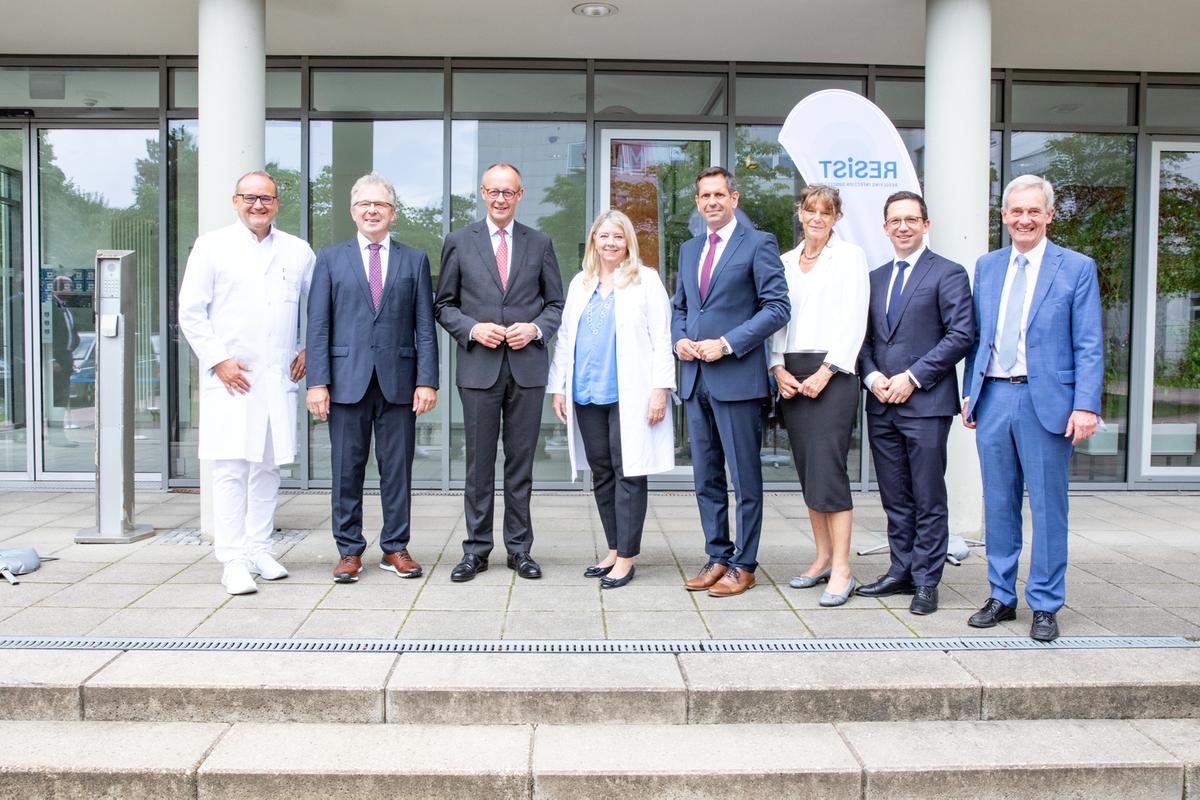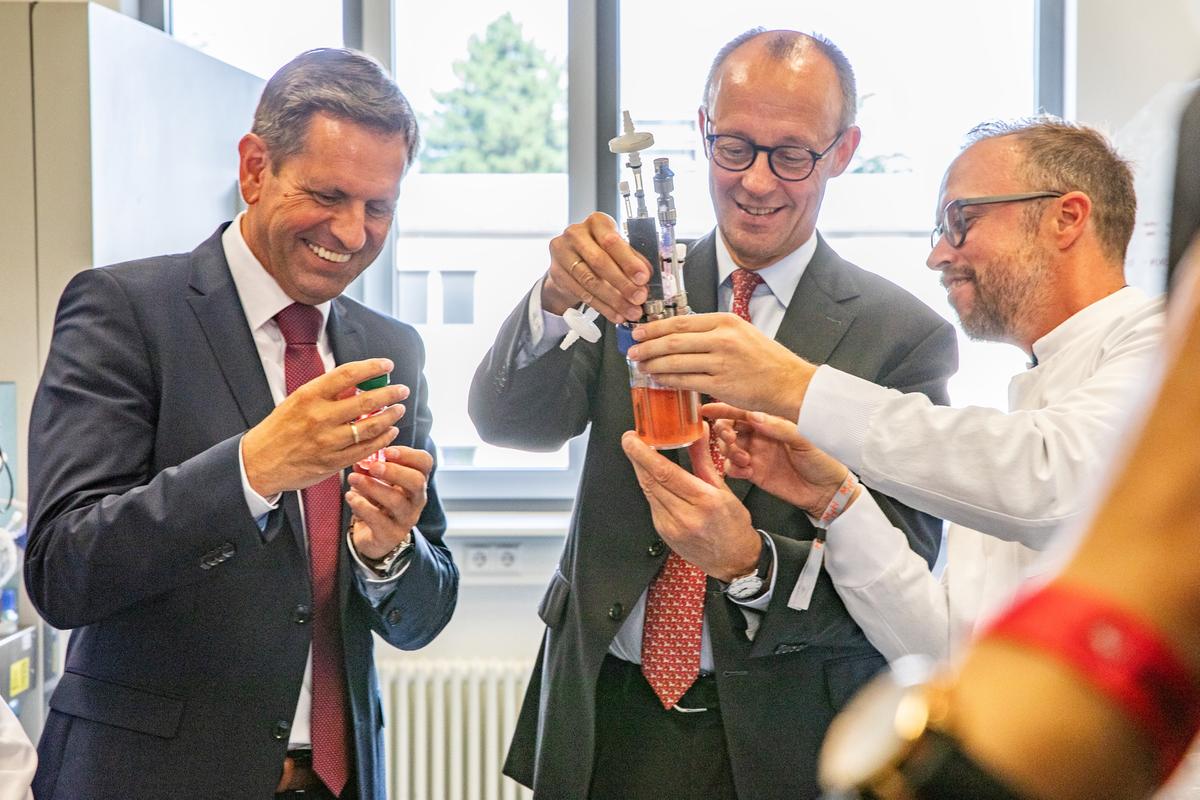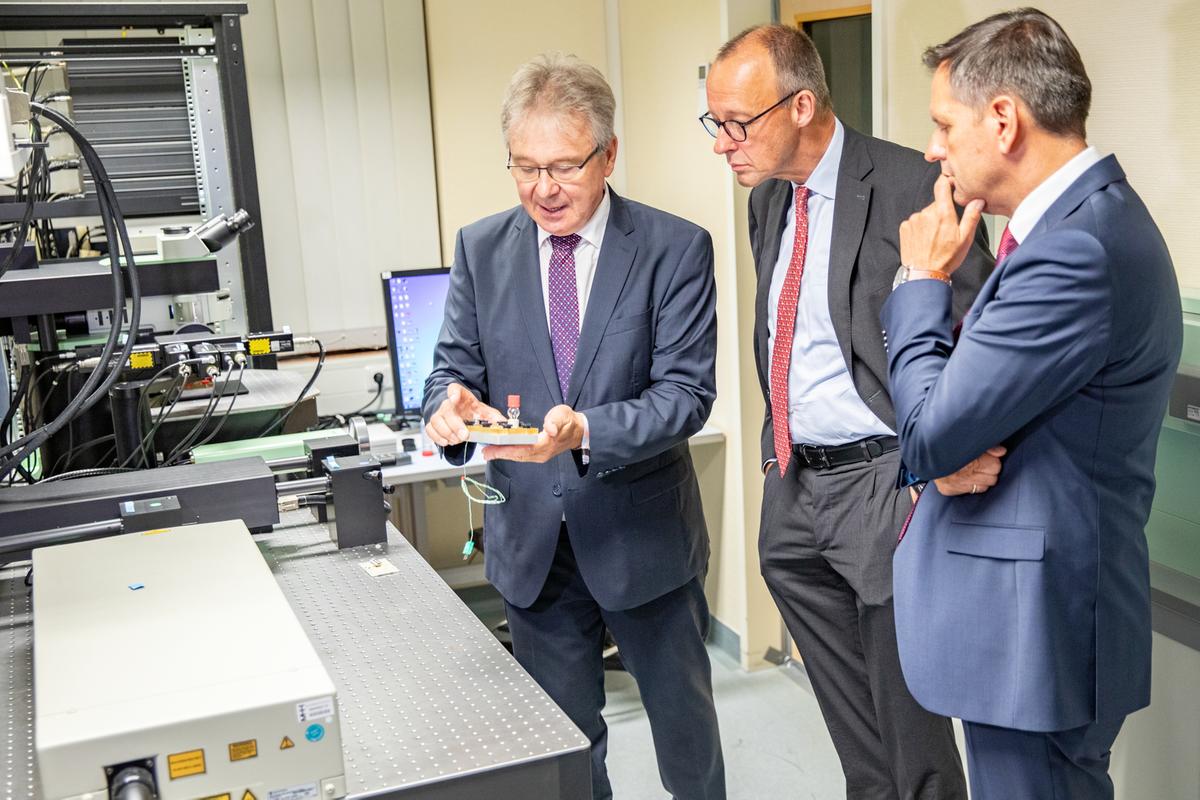During his inaugural visit to Lower Saxony, Federal Chancellor Friedrich Merz visited the MHH to learn about the RESIST Cluster of Excellence.

Satisfied faces (from left): Professor Markus Cornberg, Professor Reinhold Förster, Federal Chancellor Friedrich Merz; Professor Gesine Hansen, Minister President Olaf Lies, MHH President Professor Denise Hilfiker-Kleiner, Science Minister Falko Mohrs and Professor Thomas F. Schulz. Copyright: Karin Kaiser/MHH

Cells of the future: Professor Nico Lachmann shows Federal Chancellor Friedrich Merz and Minister President Olaf Lies a bioreactor in which he uses the body's own stem cells to produce certain immune cells (so-called phagocytes) that can destroy bacteria. Copyright: Karin Kaiser/MHH

Defence in real time: Professor Reinhold Förster shows his research to Federal Chancellor Friedrich Merz and Minister President Olaf Lies. Copyright: Karin Kaiser/MHH
Chancellor Friedrich Merz arrived at the campus of the Hannover Medical School (MHH) today in an autonomous electric VW ID.Buzz together with Lower Saxony's Minister President Olaf Lies to learn about the RESIST Cluster of Excellence. The MHH was the second stop on the Chancellor's inaugural visit to Lower Saxony after the State Chancellery.
MHH President Prof. Dr. Denise Hilfiker-Kleiner and RESIST spokesperson Prof. Dr. Reinhold Förster welcomed the Chancellor and the Minister President and gave them an initial insight into the work of the MHH and the RESIST Cluster of Excellence. ‘We are delighted to be able to present our RESIST Cluster of Excellence to you,’ said Professor Förster. ‘We conduct research to better protect particularly vulnerable people from infections with viruses and bacteria – these include newborns, senior citizens, people with congenital immune deficiencies and people whose immune systems are suppressed for therapeutic reasons. RESIST aims to prevent infections and develop better diagnoses and therapies.’ Professor Förster explained the research and goals of RESIST together with co-spokesperson Prof. Dr. Gesine Hansen and co-spokesperson Prof. Dr. Thomas F. Schulz, as well as Prof. Dr. Markus Cornberg, Director of the Centre for Individualised Infection Medicine (CiiM) and Clinical Director of the Helmholtz Centre for Infection Research (HZI). To illustrate the research being conducted at RESIST, the guests then visited two laboratories and met two patients.
Chancellor Merz is very impressed
‘I was impressed by the research successes of the RESIST Cluster of Excellence,’ said Chancellor Merz after his visit. "I had the opportunity to meet a young family with a premature baby who survived sepsis thanks to collaboration between different areas of research. Practical examples like this show how essential basic research is for developing new therapies. I am really very impressed. It was also an extremely encouraging visit for me emotionally to see what we are capable of – in prevention, diagnostics and therapy.‘ With regard to autonomous driving and research at the MHH, the Federal Chancellor summed up his visit to Hanover with the words: ’This is Germany at its very best.‘
’Lower Saxony has a future – and the MHH is part of our future. We have seen impressive evidence of this today in the RESIST cluster with its expertise in research and clinical practice,‘ concluded Lower Saxony's Minister President Olaf Lies. ’We were able to talk to the parents of baby Leon, who would not have survived without the treatment he received at this university hospital, and to a patient who would have had no future without the MHH. We are proud of our MHH."
MHH President Professor Hilfiker-Kleiner hopes that the Chancellor will return: "We are delighted that the Chancellor visited the MHH and took an interest in us. As a supramaximal care provider, the MHH stands for excellent, patient-oriented medicine, supported by science-based, translational teaching and interprofessional cooperation between all healthcare professions. We are the only pure medical university in Germany and are applying to become a University of Excellence in the nationwide competition for top-level research. Now we feel supported by the Chancellor."
The four stops
Cells of the future
In the first laboratory, RESIST professor Dr Nico Lachmann and his team explained groundbreaking, cell-based therapeutic approaches to antibiotic-resistant bacterial infections. The focus is on the body's own immune cells, which can specifically destroy pathogens. He produces these scavenger cells (macrophages) from induced pluripotent stem cells (iPSCs) – these are stem cells produced from body cells. Professor Lachmann's team has established a globally unique technology: the scalable, biotechnological production of human immune cells (e.g. macrophages) from induced pluripotent stem cells (iPSCs). The researcher showed guests how human immune cells can be produced from iPSCs in bioreactors and how these cells eliminate pathogens. The ability to produce human immune cells in unlimited quantities lays the foundation for novel therapeutic options for the treatment of infectious diseases. In Germany, 40,000 to 50,000 patients per year could potentially benefit from this therapy.
Real-time defence
In the second laboratory, Professor Förster demonstrated research focusing on human cytomegalovirus (HCMV). The body can normally keep these viruses under control. However, if the immune system is severely weakened – for example, after a transplant – they can become active again and cause serious infections. It is possible to treat such infections with T cells that specifically attack the virus, and this therapy is already being tested in clinics. However, it is not yet known exactly how HCMV-specific T cells recognise and fight infected cells in real human lung tissue. Professor Förster's team is investigating this. To do this, the researchers infect very thinly sliced lung tissue with HCMV. The virus is programmed to produce a green fluorescent protein as soon as a human cell is infected. T cells marked with a red dye are then added. Using a two-photon microscope, it is now possible to observe in real time how the immune cells kill infected cells. In the long term, the results could contribute to the development of better, individually tailored cell therapies to protect particularly vulnerable patients more effectively and safely against HCMV infections after transplantation.
Protection for premature and newborn babies
Professor Hansen and her team explained infection research that benefits newborns to guests in the presence of a patient (a baby) and his parents. Neonatal sepsis (blood poisoning) is one of the leading causes of infant mortality worldwide, especially among premature babies.
Until recently, it was assumed that the immaturity of the immune system in newborns was responsible for their high susceptibility to infection. However, the researchers have found that high concentrations of the protein S100A8/A9 Alarmin (S100 for short) in the blood of newborns and in breast milk prevent excessive immune responses in newborns, thereby protecting them from sepsis. Accordingly, low blood levels of S100, which occur regularly in premature babies, are associated with an increased risk of severe infections. In experimental models, the team was able to show that a single dose of S100 after birth significantly reduces the risk of infection. The researchers have found that S100 regulates the immune system of newborns and promotes the favourable development of the gut microbiome. These findings can be used to develop new strategies for preventing severe infections in premature and full-term babies. The researchers are conducting initial clinical trials and investigating the industrial production of S100 so that this protective protein can be added to infant formula if necessary.
New treatment for brain inflammation
Prof. Dr. Thomas Skripuletz and his team then presented a new therapy for the deadly disease progressive multifocal leukoencephalopathy (PML) in the presence of patient Jürgen Brünning-Kuhlmann. PML is a rare but very serious viral infection of the brain that occurs primarily in people with weakened immune systems. It is caused by the JC virus (also known as HPyV2). PML now mainly affects people with blood cancer who are receiving drugs to suppress the tumour and therefore have a weakened immune system. Without treatment, up to 90 percent of those affected die within a few months of diagnosis. In Germany, around 100 to 150 new cases of PML are diagnosed every year. As the immune system is severely weakened in many of these patients, there is often no simple treatment. A new therapeutic approach involves specifically supporting the immune system with special defence cells known as virus-specific T cells. At the MHH, this treatment concept has been developed in such a way that patients can be treated with virus-specific T cells isolated from healthy donors within a very short time. In the majority of patients treated to date, T cells have prevented further progression of the disease and led to stabilisation or improvement of clinical deficits. In RESIST, we are investigating how the transferred cells can be optimised for therapy.
RESIST – Research for the most vulnerable
The aim of the RESIST Cluster of Excellence ‘Resolving Infection Susceptibility’ is to better protect particularly susceptible people from infections. Viruses and bacteria should no longer be able to cause them serious harm. RESIST aims to enable better prevention, diagnosis and therapy – for example, for newborns, seniors, people with congenital immune deficiencies and people whose immune systems are suppressed for therapeutic reasons.
RESIST consists of around 60 physicians working in the clinic, basic researchers and their teams. They work in six partner institutions (MHH, HZI, CiiM, TWINCORE, CSSB, CCI and TiHo) and cooperate with the DZL, the DZIF and the University of Lübeck. The focus of interest is on the human immune system, genetics, viruses and bacteria. RESIST is funded by the German Research Foundation (DFG).
More information can be found here: www.RESIST-cluster.de
Text: Bettina Bandel